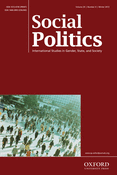-
Views
-
Cite
Cite
Celeste Montoya, Lise Rolandsen Agustín, The Othering of Domestic Violence: The EU and Cultural Framings of Violence against Women, Social Politics: International Studies in Gender, State & Society, Volume 20, Issue 4, Winter 2013, Pages 534–557, https://doi.org/10.1093/sp/jxt020
Close - Share Icon Share
Abstract
Violence against women is a universal problem, affecting women at all levels of society; however, differently situated women have unique experiences with violence. Theoretically, this calls for the necessity to balance universality with intersectionality. Analyzing EU policy texts, we argue that the recognition of different forms of violence has led to an increased tendency toward culturalization, i.e. articulating culture as the only explanation behind certain forms of violence or focusing exclusively on culturalized forms of violence. While largely ignoring the gendered nature of violence, cultural framings of violence also create a dichotomy between “insiders” (non-violent Europeans) and “outsiders” (violent others).



